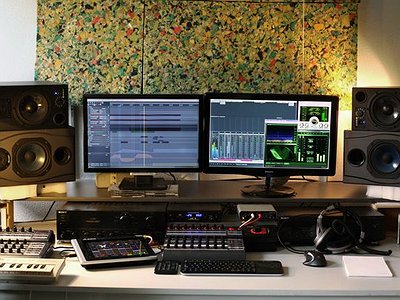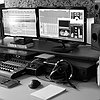Listen carefully
Budgets for productions are being reduced and more and more people are choosing to listen to music in compressed formats and on low-quality playback devices. In which way is this affecting music and how would you rate the state of production today?
The funny thing is that we now see what listeners have been interested in all these decades. Ever since the invention of recording technology, the industry has been striving for better sound quality. It was a major selling point. Think about the quality of wax roles all the way up to Super Audio CDs. But with the arrival of mp3 and the Internet it has become clear that by far, most listeners are not interested in 24bit/96khz sound but in 320kbs mp3 sounds. That’s enough. Personally I regret it, and audiophiles may lament but that’s what reality is. The mastering engineer’s task is to take into account that the music must also sound good during playback by Spotify.
The equipment-industry suggests that new equipment keeps making productions better. How much do you believe in the idea of progress in mastering? What are areas where you could imagine real improvements?
A lot of money is spent on digitally emulating studio gear. There’s a plugin where you get the sound of Abbey Road Studios of the 1960’s. There’s a lot of tape simulation software. I stay out of that sort of nonsense. I try to approach the sound objectively, from a technical standpoint and take it from there. Actually everything is already there. Yes, new stuff is brought to the market but when you look at it properly it’s either something that offers a certain colouration to the tone or it’s something that speeds up the process though a bunch of presets. And for those who can afford the outdoor equipment: I hope you’ll see your investment returned.
It has often been suggested that "the future of music is in live”. How do you feel about the ongoing relevance of recordings as an art form? What can recordings provide what a concert can not?
Live music is relatively expensive. It’s a one off, it has a limited audience. But it can be a great experience! A live performance is something exclusive. You can see it in the ticket prices, which have risen dramatically over the past few years. But the audience regards it as something special and people are prepared to pay for that.
Recordings also keep coming. Because people want to have this reflection of the artist through his music. Recordings keep the connection alive between artist and listener. We shouldn’t forget that a listener not only buys the track but also the social experience that is connected to it.
Usually, it is considered that it is the job of the producer and/or mastering engineer to make a recording sound great. But listening is also an active, rather than just a passive process. How do you see the role of the listener in the musical communication process?
Beauty is in the ear of the beholder. A good mastering engineer is able to contribute a part of the potential of the ‘carrier’, the cd, dvd, stream; in a technical way. An artist can make a connection with the listener if both parties are able and want to. Most people don’t listen (active) but only hear (passive). So the intention of the listener is crucial. But in the case that the receiver listens, that connection can be quite strong.
Please recommend two recording/mixing/mastering engineers to our readers which you feel deserve their attention.
Old dog: Greg Calbi at Sterling Sound. He’s mastered many many many records and among those several of my all time favourites, like Talking Heads’ Remain In Light.
Younger dog: Rashad Becker of Dubplates and Mastering. He’s not as glamorous as Greg but he’s a real pro and extremely occupied with the technology of vinyl mastering. And just like me, he’s into mid/side mastering. There aren’t many like him.
To read more about Jos Smolders and his work, visit earlabs.org







